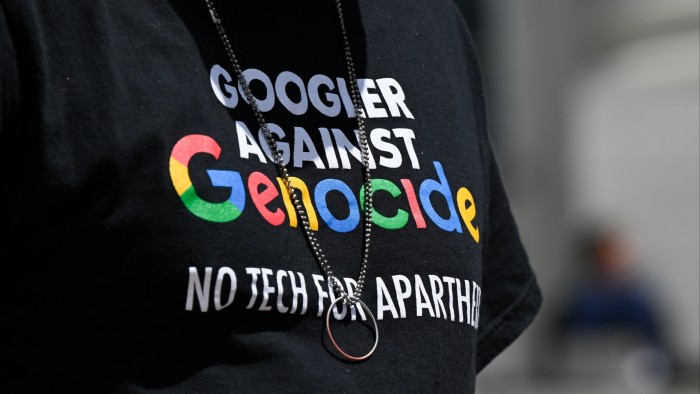Unlock the Editor’s Digest for free
Roula Khalaf, Editor of the FT, selects her favourite stories in this weekly newsletter.
Google DeepMind staff in the UK are seeking to unionise in an effort to challenge the company’s decision to sell its artificial intelligence technologies to defence groups and ties to the Israeli government.
Around 300 London-based employees of the tech giant’s AI arm, which is led by British Nobel laureate Sir Demis Hassabis, have sought to join the Communication Workers Union in recent weeks, according to three people briefed on the move.
The effort creates new strain on DeepMind which is being pushed by its corporate parent to find commercial uses for its powerful AI, with Hassabis suggesting recently that companies in democratic countries should work together to support national security.
The move to unionise follows growing discontent at the company after Google dropped a pledge in February not to develop AI technologies that “cause or are likely to cause overall harm”, including weapons and surveillance.
Three people involved with the unionisation drive said media reports that Google is selling its cloud services and AI technology to the Israeli Ministry of Defence has also caused disquiet. The Israeli government has a $1.2bn cloud computing agreement with Google and Amazon, named Project Nimbus.
Further tension was caused by media reports that the Israel Defense Forces have used AI systems to generate targets for assassinations and attacks in the Gaza strip, although it is unclear if the IDF is using commercially purchased software for those purposes, or building its own. The IDF did not reply to a request for comment.
“We’re putting two and two together and think the technology we’re developing is being used in the conflict [in Gaza],” said one engineer involved in the unionisation effort. “This is basically cutting-edge AI that we’re providing to an ongoing conflict. People don’t want their work used like this.”
“People feel duped,” the person added.
According to correspondence seen by the FT, five DeepMind staff have quit over the past two months citing the Israel cloud computing deal and Google’s reversal of existing commitments around the use of its AI. In the US, Google fired some staff for staging sit-in protests over Project Nimbus.
In May 2024, DeepMind staff sent a letter to the company’s leadership calling on it to drop its military contracts, and have held some meetings with management, but their requests have been denied.
The effort to organise will now need to be recognised by the company, through a vote among DeepMind employees in the UK. The AI unit has around 2,000 staff in the UK.
A spokesperson for Google said: “Our approach is and has always been to develop and deploy AI responsibly. We encourage constructive and open dialogue with all of our employees. In the UK and around the world, Googlers have long been part of employee representative groups, works councils and unions.”
The company said it still complies with its AI principles for responsible development, but that the landscape has changed significantly since its 2018 pledge against AI weapons and surveillance.
Unionisation remains relatively rare across the tech sector, which has long resisted attempts to organise its workforce. But there has been growing activity in recent years, including at Amazon and Apple. Google employees founded the Alphabet Workers Union in the US in 2021.
One person said that if the union gains recognition from DeepMind, it will seek to meet management to request that the company changes course on defence deals and, if unsuccessful, to consider strike action. They said that colleagues in the US were also in discussions about unionisation.
“What I hope and what people who are active are hoping is that we stay away from any military contracts,” they added.
Google has faced similar protests over its military ties before. In 2018, several staffers quit and thousands of employees signed a petition in protest against Project Maven, a contract for the US military that used AI technology to improve drone strikes. Following widespread staff discontent, Google did not renew its contract with the Pentagon and pledged not to work on AI technologies for weapons or surveillance.
One senior figure in the CWU union who is not a DeepMind employee said that when the company was first founded it “attracted lots of smart people that wanted to work on things for genuine good”, but that Google had started “chasing military money”. Google bought the company in 2014.
They noted that staff at DeepMind are often on high salaries. “They’re not joining the trade union for pay negotiations. They’ve joined because they’ve seen the benefits of collectivising to hold Google to account for their stated ethics,” they said.
The engineer at DeepMind who has joined the CWU and is involved in organising discontented staff, said that “joining a union is probably the craziest thing a lot of DeepMinders would have ever thought they’d do” but “people’s level of discomfort has slowly risen over the past few years”.
The company is “sacrificing morals for greed”, the employee added.




